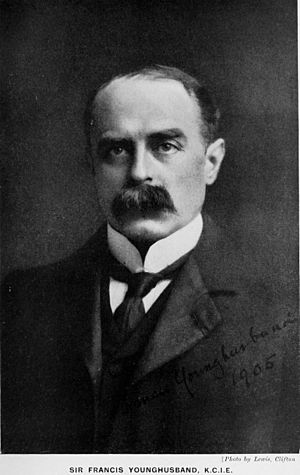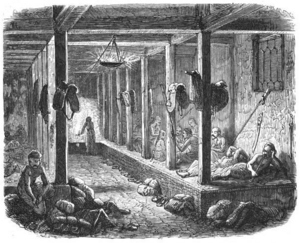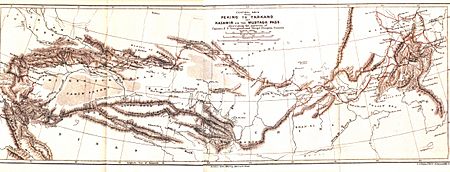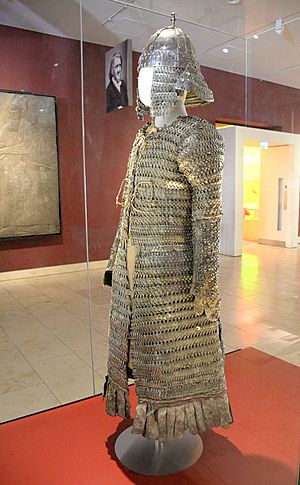Francis Younghusband facts for kids
Quick facts for kids
Sir Francis Younghusband
|
|
|---|---|

Francis Younghusband c. 1905
|
|
| Born | 31 May 1863 |
| Died | 31 July 1942 (aged 79) |
| Nationality | British |
| Alma mater | Royal Military College, Sandhurst |
| Occupation | British Army officer, explorer, and spiritual writer |
| Spouse(s) | Helen Augusta Magniac |
| Awards | Order of the Star of India Order of the Indian Empire Charles P. Daly Medal (1922) MacGregor Medal |
Sir Francis Edward Younghusband (born May 31, 1863 – died July 31, 1942) was a British Army officer, explorer, and writer. He is best known for his journeys in Asia, especially his leadership of the British expedition to Tibet in 1904. He also wrote many books about Asia and international relations. Younghusband held important roles, including British commissioner to Tibet and President of the Royal Geographical Society.
Contents
Early Life and Education
Francis Younghusband was born in 1863 in Murree, which was then part of British India and is now in Pakistan. He came from a family with a strong military background. His uncle, Robert Shaw, was also a famous explorer of Central Asia.
As a baby, Francis moved to England with his mother. When his mother returned to India in 1867, he was looked after by two strict aunts. In 1870, his parents came back to England, and the family was together again. At age 13, Francis went to Clifton College in Bristol. In 1881, he joined the Royal Military Academy Sandhurst, a military training school. A year later, he became a junior officer in the 1st King's Dragoon Guards.
Adventures as an Explorer
Francis Younghusband was very interested in the "Great Game," which was a secret rivalry between the British and Russian empires in Asia. In 1886–1887, while on leave from his army duties, Younghusband went on a long journey across Asia. He sailed to China and then traveled 1200 miles across a desert. His official reason was to map the area, but he was also looking for signs of Russian military threats to British India.
He explored Manchuria and visited the Changbai Mountains. When he arrived in India, he got three months off from his duties. His travel notes and scientific observations were very helpful to the Royal Geographical Society. For example, he found that the highest peak of the Changbai Mountains was only about 8,000 feet tall, much lower than what British maps showed.
Younghusband then crossed the Taklamakan Desert to Chinese Turkestan. He found a new route from Kashgar to India through the difficult Mustagh Pass. He reported his findings to the Viceroy of India, Lord Dufferin. This journey took him through the Karakoram Range, the Hindu Kush, and the Pamirs, where three large empires met. For this amazing achievement, at just 24 years old, he became the youngest member of the Royal Geographical Society. He also received the society's highest award, the Patron's Gold Medal, in 1890.
In 1889, Younghusband became a captain. He was sent with a small group of Gurkha soldiers to explore an unknown area north of Ladakh. This area was troubled by raiders from Hunza who were disrupting trade. While camping by the Yarkand River, Younghusband met Captain Bronislav Grombchevsky, a Russian explorer. The two rivals had dinner and talked about the possibility of Russia invading British India. They showed off their soldiers' skills: the Cossacks' horsemanship and the Gurkhas' rifle drills. After their meeting, Grombchevsky continued towards Tibet, and Younghusband explored the Karakoram.
Diplomatic Roles
Younghusband later joined the Indian Political Service, working as a political officer. He was asked to visit Lhasa, the capital of Tibet, disguised as a trader, but he refused. He traveled with Gurkha soldiers to Hunza to help restore trade and stop raids into Kashmir. He met with the ruler of Hunza, Safdar Ali, to discuss stopping the attacks on traders. Younghusband showed the British military's strength, which made an impression. He returned to India by Christmas.
In 1890, Younghusband went on another mission to Chinese Turkestan with George Macartney, who was an interpreter. They spent the winter in Kashgar, where Macartney stayed on as the British consul. Younghusband wanted to explore the Pamir Gap, a possible route for Russian forces into India. He also needed to make sure the Chinese in Kashgar were cooperating.
In July 1891, Younghusband was in the Pamirs when he heard that the Russians planned to send troops there. On August 12, he met Russian Cossack soldiers who forced him to leave the area. This event contributed to the Hunza-Nagar Campaign. The Russians claimed the area for the Tsar, even though the British believed it was Afghan territory.
During his time in Kashmir, Younghusband wrote a book called Kashmir. He greatly admired the natural beauty and history of the region. The "Great Game" between Britain and Russia continued until 1907. Younghusband, along with other explorers like Sven Hedin and Sir Auriel Stein, played a part in this rivalry.
Expedition to Tibet
In 1902, Lord Curzon, the new Viceroy of India, appointed Younghusband as the British commissioner to Tibet. This was because of rumors that Russia was expanding into the Hindu Kush and had a presence in Tibet.
In 1903, Younghusband led the British expedition to Tibet. The official goal was to settle border disputes between Sikkim and Tibet. However, Younghusband went beyond his orders from London, and the expedition became an invasion of Tibet.
About 100 miles inside Tibet, on the way to Gyantse, the British forces met Tibetan militia, mostly monks. The British troops were well-trained and had modern rifles and machine guns. The Tibetan monks were disorganized and had simpler weapons like hoes, swords, and old guns. The British won the battle. Some reports say that many Tibetans were killed during the campaign, while only a few British soldiers died.
The British government was embarrassed by the invasion because they wanted good relations with the Chinese government for trade. As a result, the British government rejected the treaty that Younghusband had made with Tibet, known as the Treaty of Lhasa.
Younghusband received several awards for his service, including the Companion of the Order of the Indian Empire in 1891, which was upgraded to Knight Commander in 1904. In 1917, he was made a Knight Commander of the Order of the Star of India. He also received the Kaisar-I-Hind Medal in 1901 and the Gold Medal of the Royal Scottish Geographical Society in 1905.
In 1906, Younghusband lived in Kashmir as the British representative. He returned to Britain in 1909 and became an active member of many groups. In 1908, he was promoted to lieutenant colonel. During World War I, he supported a patriotic campaign that led to the famous song "Jerusalem".
Exploring the Himalayas
In 1889, Younghusband reached the base of Turkestan La (North) from the north. He noted that it was a long glacier and an important dividing range in Central Asia.
In 1919, Younghusband became the President of the Royal Geographical Society. Two years later, he became Chairman of the Mount Everest Committee. This committee was formed to plan the first British expeditions to Mount Everest, starting with the 1921 Reconnaissance Expedition. He strongly encouraged the famous climber George Mallory to try to be the first to climb Mount Everest. Younghusband remained Chairman for the 1922 and 1924 British Expeditions.
Personal Life
In 1897, Younghusband married Helen Augusta Magniac. They had a son who died as a baby and a daughter, Eileen Younghusband (1902–1981), who became a well-known social worker.
From 1921 to 1937, the couple lived in Westerham, Kent. In July 1942, Younghusband had a stroke after giving a speech at a meeting of the World Congress of Faiths. He died on July 31, 1942, and was buried in the village churchyard of Lytchett Minster, Dorset.
Spiritual Beliefs
Younghusband's religious beliefs changed over his life. He grew up as an Evangelical Christian. Later, he had a powerful spiritual experience in the mountains of Tibet. This made him feel a deep "love for the whole world" and believe that "men at heart are divine." This feeling also made him regret the invasion of Tibet.
In 1936, his strong spiritual beliefs led him to found the World Congress of Faiths. This group aimed to encourage understanding and discussion between different religions. Younghusband wrote several books with spiritual themes. He believed that the universe is a living thing and that spiritual forces guide evolution. He also thought that there might be intelligent beings on other planets.
In his 1912 book Within: Thoughts During Convalescence, Younghusband wrote: "We are giving up the idea that the Kingdom of God is in Heaven, and we are finding that the Kingdom of God is within us. We are letting go of the old idea of a God who is separate from us. Instead, we are seeing a new idea of an inner spirit working inside us. This spirit connects us all in one big spiritual unity."
Younghusband was interested in Eastern philosophy and Theosophy. He did not believe in a human-like god. He thought that a creative "life force" was at work in the universe. Scientists did not widely accept his ideas.
In Movies
The 1958 film The Inn of the Sixth Happiness, starring Ingrid Bergman, is based on the life of Gladys Aylward. In the movie, Ronald Squire plays Francis Younghusband.
Books by Younghusband
Francis Younghusband wrote 26 books between 1885 and 1942. His books covered many topics, including his travels in Asia, exploration, mountaineering, philosophy, spirituality, and politics.
- Confidential Report of a Mission to the Northern Frontier of Kashmir in 1889 (1890)
- The Relief of Chitral (1895) (with his brother George John Younghusband)
- South Africa of Today (1896)
- The Heart of a Continent (1896)
- Kashmir (1909)
- Mutual Influence: A Re-View of Religion (1915)
- The Sense of Community (1916)
- The Gleam (1923)
- Modern Mystics (1923)
- Mother World in Travail for the Christ that is to be (1924)
- Wonders of the Himalayas (1924)
- The Epic of Mount Everest (1926)
- Life in the Stars (1927)
- The Light of Experience (1927)
- Dawn in India (1930)
- The Mystery of Nature (1934)
- The Sum of Things (1939)
- Vital Religion (1940)
|
See also
 In Spanish: Francis Younghusband para niños
In Spanish: Francis Younghusband para niños
 | Victor J. Glover |
 | Yvonne Cagle |
 | Jeanette Epps |
 | Bernard A. Harris Jr. |




